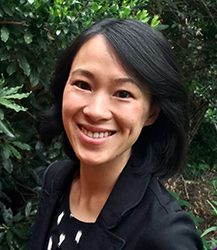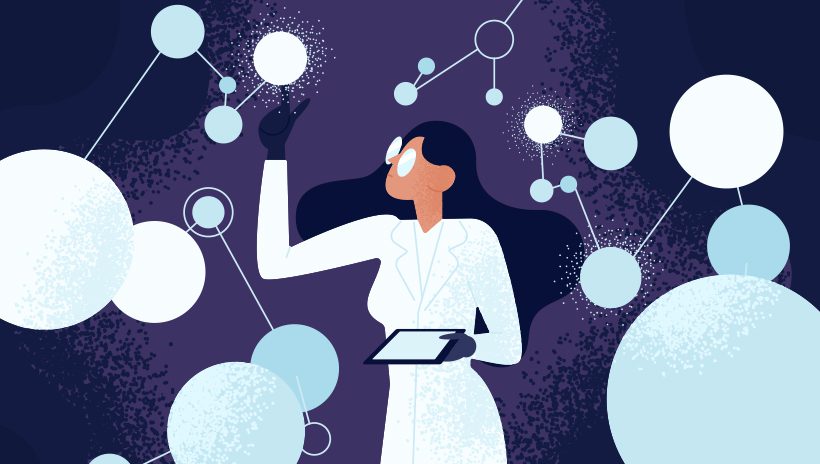Some of the most pressing topics in current events today relate to science, from the COVID-19 pandemic to climate change. It’s more important than ever for students to have the skills to parse scientific information, evaluate sources to determine their reliability and relevance, and incorporate accurate knowledge of science into their everyday lives.
Scientific literacy is one subset of information literacy: the skills required to find, evaluate, and use information thoughtfully and appropriately. Because scientific information is based on ever-evolving research, scientific literacy can feel daunting to achieve. But an understanding of the components of scientific literacy will help instructors and students build a foundation of skills that will allow for lifelong critical thinking and learning about scientific issues.
Outside of the classroom, students, consumers, and professionals face vast amounts of information, not all of which is created or shared equally. According to the Science Literacy Foundation, teaching science literacy is essential for the health of the broader community. Misinformation and lack of critical evaluation can undermine trust, equality, and democratic practices. When we understand how science is practiced, we can better evaluate new and existing facts and help others to take an evidence-based approach to decisions ranging from personal well-being to policy creation (Science Literacy Foundation, 2021).
Because of how intertwined science is with current events, politics, economics, and other disciplines, the skills and knowledge required to achieve scientific literacy aren’t confined to science class. Scientific literacy requires not just content knowledge but also an understanding of how scientific research works and evolves. Scientific literacy can be best achieved when it is a common goal for librarians, science educators, science writers, and students alike.
Dimensions of Scientific Literacy
There is not a single, uniformly accepted definition of scientific literacy. Some users of the term may think of scientific literacy primarily as content knowledge, while others may focus on the importance of understanding the scientific research process. While the level of content or process knowledge needed may vary depending on the specific situation, holistic scientific literacy will almost always combine foundational scientific knowledge with critical thinking and information literacy skills.
Howell and Brossard (2021) present a framework for understanding and defining scientific literacy. In their paper “(Mis)informed About What? What It Means to Be a Science-Literate Citizen in a Digital World,” they articulate three overlapping areas that constitute scientific literacy: civic science literacy, digital literacy, and metacognition. Let’s apply these three areas to an example: students researching the issue of marijuana use in professional athletes. These students will rely on the following layers of literacy to expand their understanding of the topic and how it is presented to the scientific community and the public.
Civic Science Literacy
The first layer of scientific literacy, as defined by Howell and Brossard, is civic science literacy, which includes both an understanding of foundational concepts, such as the scientific method, and subject knowledge of particular areas of science. Scientifically literate students are aware that scientific research is conducted to meet very specific standards related to data collection and analysis and ethics. To grasp the significance of studies and articles about marijuana in sports, the students in our example would ideally possess familiarity with concepts such as the stages of scientific research and some knowledge of appropriate data-collection methods. In addition to this foundational knowledge, the students would be best able to analyze information on this topic if they could draw on subject knowledge to better understand the physiological impacts of marijuana use in sports performance and recovery. Using a combination of information literacy skills and subject knowledge, the students can begin to form an opinion on the topic based on credible evidence.
Digital Literacy
Howell and Brossard name digital literacy as the second key component in scientific literacy. Building on their understanding of how science is practiced, students must also apply their understanding of information production and dissemination. This involves evaluating content including popular sources like social media that publish information about the issue. For example, the digitally literate student will be able to distinguish authoritative content, such as a medical study, from opinion-based material from a nonexpert.
Digital literacy skills are not only an essential component of scientific literacy, they are also a key part of information literacy in general. Students may initially be introduced to the importance of these skills in a context like a research skills or library instruction course. It’s vital that students understand that these skills can and should be used to evaluate all types of information, including scientific information. Librarians and science educators, and their students, mutually benefit from collaborations that reinforce the relevance of information and digital literacy skills for interpreting and understanding scientific information and the processes involved in creating it.
Metacognition
For an objective, nuanced understanding of an issue, the student must also be able to recognize the personal or institutional factors that may influence the way information is evaluated. This brings Howell and Brossard to their third component of scientific literacy: metacognition. In our marijuana example, metacognition could mean students acknowledging how their own beliefs about marijuana, or their opinions about oversight in professional sports, may influence their ability to critically evaluate a source. In order to apply metacognition to their evaluation of scientific materials, students must have exposure to critical-thinking skills. Ideally, such skills are practiced across the curriculum, but they may be introduced in settings that are not directly connected to science instruction. It is important for instructors and students to consider and discuss issues impacting information evaluation across disciplines, including science.
Applying Scientific Literacy
As we can see, achieving scientific literacy goes beyond learning a set of facts or keeping up on current events. True scientific literacy involves synthesizing information literacy and critical-thinking skills with content and process knowledge about science and scientific research. As a result, it’s important to think about scientific literacy instruction as a responsibility shared across a student’s educational experience.
No student, or even professional adult, will have the scientific content expertise to fully understand every scientific issue that comes up in the news. But combining foundational scientific knowledge with the critical and analytical skills required to identify knowledge gaps, seek out authoritative sources, and appreciate the arc of the scientific research process empowers nonexperts to engage with scientific issues thoughtfully and make decisions accordingly.
Information Literacy – Health Science offers health science-specific instructional content to help students build foundational skills. Learn more.
Sources
Howell, Emily L. and Dominique Brossard. 2021. “(Mis)informed About What? What It Means to be a Science-Literate Citizen in a Digital World.” Proceedings of the National Academy of Sciences of the United States of America 118(5): e1912436117. https://doi.org/10.1073/pnas.1912436117.
Science Literacy Foundation. 2021. “Science for All and All for Science: Road Map to a New Science Literacy.” Accessed September 23, 2021. https://www.scienceliteracyfoundation.org/road-map-for-a-new-science-literacy/#building-the-new-science-literacy.
See also:
- Webinar: Finding the Time: Prioritizing IL Instruction in a Crowded Health Science Curriculum
- White Paper: The Credo IL Strategy Handbook, Second Edition
- Making the Necessary Adjustments to Teach Virtually: Interview with Ayaba Logan
- Teaching Information Literacy Through Comics and Graphic Novels: Resources and Ideas
- Apply the ACRL Framework through Infobase Products to Reinforce Information Literacy
About the Authors
 Devon Lee began her work in the field of information literacy with Credo Reference in 2016. Developing tutorials, videos, and assessments for the Credo InfoLit products has given her the opportunity to dive deep into topics from evidence-based practice to digital citizenship. She has a B.A. in History from the University of California, Davis, and a Masters in Library and Information Science from San Jose State University.
Devon Lee began her work in the field of information literacy with Credo Reference in 2016. Developing tutorials, videos, and assessments for the Credo InfoLit products has given her the opportunity to dive deep into topics from evidence-based practice to digital citizenship. She has a B.A. in History from the University of California, Davis, and a Masters in Library and Information Science from San Jose State University.

Tamar Rubin is Manager of Learning Design at Credo, an Infobase Company, where she has worked for six years as a designer of information literacy content for libraries. She has an MSLIS from the University of Illinois and a BA in history from Yale University.




